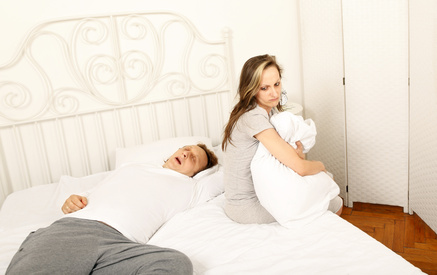How Dentist Provided Oral Appliances Can Help with Snoring and Sleep Apnea
Snoring is an exceptionally common problem for people of all ages and genders. Though not usually harmful, snoring can disrupt sleeping and cause tension in relationships. Snoring is also one of the symptoms of sleep apnea, a severe condition that is hard to identify. Dentists have the opportunity to successfully treat both snorers and mild sleep apnea sufferers in a variety of ways, with the most effective being with oral appliances.
Muscles relax during sleep and this includes those inside your mouth (tongue, tonsils, soft palate, walls), which will vibrate during breathing. Relaxed oral muscles can partially block the airway and force air to travel through a smaller passageway. The narrower the passageway, the more vibration of the muscles and the louder snoring becomes. Not a serious problem on its own, snoring can however cause issues for people living with the culprit. Snoring is a warning sign of a more serious condition; a significant amount of people who snore also suffer from obstructive sleep apnea.
Obstructive sleep apnea is a condition in which the soft muscles of the throat block the airway completely. The brain usually recognises that the airway is disrupted and will wake the sleeper up in order to re-open the passageway. Sufferers of sleep apnea usually experience daytime fatigue due to interrupted sleep alongside other potential symptoms such as headaches, mood swings and memory problems. People with sleep apnea are at risk for high blood pressure and stroke. If you snore loudly and frequently, experience extreme fatigue and stop breathing or gasp in your sleep, you may be suffering from sleep apnea.
Dentists have a great opportunity to help and treat people with snoring and mild sleep apnea with the use of oral appliances. These appliances fit into two basic categories: mandibular advancing devices (MAD) and tongue-retaining devices (TRD). Each type of device uses difference methods to help open the airway and allow the patient to breathe easier. Both types of appliance have been proven to work effectively and help treat snorers and sleep apnea sufferers, though do not cure the condition.
Mandibular advancing devices fit over upper and lower teeth and push the lower jaw forward to improve airflow while tongue-retaining devices are custom-made applicants that hold the tongue forward during sleep using suction. MAD appliances are currently the most widely used and have the appearance of a sports mouth guard. The presence of at least several healthy teeth are required for use of a MAD device, with TRD appliances are considered for suitable for patients with few or no teeth and/or a large tongue. Use of a TRD can cause tongue irritation over long-term use.
There are no guarantees that an appliance will successfully work for every patient, and there are various side effects including dry mouth, teeth discomfort and tissue irritation. Some tooth movement is also possible. Oral appliances must be provided by a dentist or orthodontist for the best fit possible. Therapy using oral appliances can take several weeks or several months. Patients are usually encouraged to take other steps to ease their snoring and sleep apnea alongside using the oral appliance. Suggestions for patients may include improving overall health and weight, reducing alcohol consumption before bed and avoiding sleeping on their back.
Dentists have a vital role to play in treatment of snoring and sleep apnea. Oral appliance therapy is remarkably effective in assisting sufferers, with the treatment helping to reduce frequency and loudness of snoring and therefore improve sleep patterns. Obstructive sleep apnea is a serious condition but dentists can work alongside sleep specialists to enhance the quality of life of sufferers.
Tags: Dental office treat Snoring, snoring and sleep apnea, snoring and sleep apnea treatment, Snoring Treatment, teeth discomfort and tissue irritation

Recent Comments